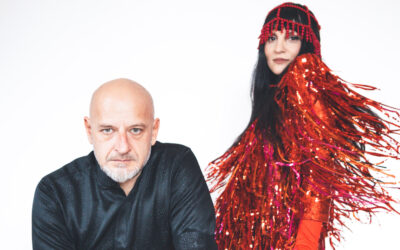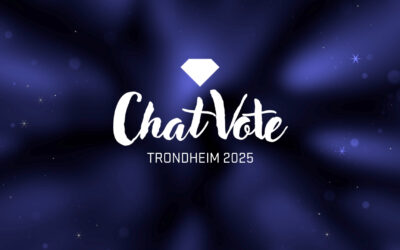
Say yay, Spain – you’re actually making progress!

Say yay, Spain – you’re actually making progress!
We all know when Eurovision ends: it’s when we hear the final seconds of the closing Te Deum. But when does the new season start? There’s no one answer. Is it September 1st? Or when the first artist is announced? Maybe it’s when the first national final reveals its songs, or the first national final of the season is broadcast? For me, the season starts when the first selection I really care about takes place, and this year the honor fell to Spain.
I’ve watched all ten editions of Operacion Triunfo, five of which have been used for the Eurovision entry selection – so that explains a lot about the level of my emotional involvement, and more so why I find myself paying a lot of attention to the details. There are many countries that are yet to “get” the modern Eurovision game, and even though they try, change is hard and getting it right is harder. I always say that we want to see things go from point A to point B, but in reality, you typically have to go via a whole load of other letters first. It’s a process, and sometimes even seeing enough small changes in the right direction is a good reason to be (cautiously) optimistic.
Spain, in particular, is one case where you’d be better off not developing any real expectations. Hope never dies and all that, but this isn’t my first rodeo, you know. Using a talent show as a platform for picking an ESC entry, especially when Eurovision isn’t the sole goal, is always tricky. In Spain, things are extra complicated because the audience gets to view a live feed from the academy every day throughout the 15 weeks of the show, and that’s a lot of time to relate to participants in ways that have nothing to do with music, songs or performances.
That’s what happened to them last year: Amaia became Spain’s darling and a phenomenon, the country fell in love with her and with her love story with Alfred, and suddenly no one could imagine anything other than a duet of the two of them at ESC. Except of course no one outside Spain had a clue about who they were or the opportunity to get to know them the way their local audience did.
RTVE had a much more open field this year, partly because there was no clear-cut favorite – the audience picked a different favorite and even a different top three pretty much every week, based on performances and the events of the week. Out of all ten seasons, it was actually the one when it was the least obvious who the front runners were. On top of that, for the first time in an OT selection, the final wasn’t limited to the eventual finalists of the show. Any of the contestants who made it to the live shows of OT could participate, assuming that the writers requested them for their submitted entry and that this entry was selected.
This resulted in a very impressive cadre of established performers, producers and composers submitting songs to the selection. When we have a final made of newcomer performers it can be easy to forget that there can still be many years of experience involved in the process. I appreciated the fact that, like last year, the Eurovision selection show prominently featured the songwriters as well as the songs, and also continued the tradition of having the composer of last year’s winning entry among the jury panel (made extra special by the fact Doron Medalie not only speaks Spanish – who knew? – but has been an OT fan who watched the first season already, saying that that’s what inspired him to take a plunge and attempt making a career as a songwriter).
What was both clear and controversial was RTVE’s effort to put the songs first. By not even trying to assign each candidate to a song and not making that part of the format, they could focus on picking the best song/performer combinations out of the submissions without having to make compromises and marry songs to less suitable performers, or having to give up good songs because a performer already had one song that worked for them. It made many fans complain about favoritism and the unfairness of the process in general, but for me it was a positive sign: making sure a song competition is song-focused is never a bad thing, after all.
Having scheduled the final for a date that was a few weeks after the final of the regular season, there was no full time coverage of the rehearsals like last year, which meant we were prevented from seeing any “Lo malo”-esque meltdowns, sadly, and though even the broadcast itself was – shockingly enough – drama-free, we were not entirely without dramatic events, at least in the lead-up to the final. And there’s something to learn there too.
There were two participants in particular who dropped several hints to media about not being exactly enthusiastic about participating in ESC. While they never fully said as much, they expressed their discontent with it taking place in Israel – which they already knew at the time of singing the contract for OT participation (which included an ESC clause) – and also showed very vocal support (literally) for another entry in the line-up. While that can be interpreted as just being supportive of a friend, it did essentially come across as asking for votes to be diverted away from them. Many argued – and I actually felt the same – that it was disrespectful both to their fellow participants who didn’t even receive a song to begin with, and to the writers of their own songs.
Future advice, broadcasters? Give your contestants a quick overview of some legal concepts ahead of signing their contracts. When you put your name on the dotted line, you need to agree to everything it asks you to. You don’t get to pick and choose.
When I discussed this a friend, she argued that as long as the singers didn’t ask to withdraw from the national final, they were fulfilling their contract and therefore were free to at least be honest about how they felt about it. But even beyond the more moral aspects of showing respect to other participants, songwriters and the audience, it’s not even legally true: in Western Contract Law, Spain included, there’s a principle called “in good faith”, according to which all parties to a contract are expected to act honestly, fairly and in good faith so that the other side is not prevented from enjoying its benefits. In this case, participating in an NF but trying actively to not win it doesn’t actually honor the contract. While it’s not something RTVE (or any broadcaster, for that matter) will necessarily do anything about legally after the fact, making sure everyone is a willing participant (or at least willing to behave) ahead of time can minimize headaches like this considerably.
Unfortunately for Spanish Eurofans, one of the unwilling participants was Maria, whose “Muerdeme” joined the long list of fan favorites to have finished second in the Spanish selection. Except, of course, her fellow list members like Coral and Mirela actually wanted to go to the contest. Maria’s performance, by contrast, made it crystal clear that she couldn’t be bothered with all this Eurovision nonsense. At the end of the day, it’s such a waste: even if “Muerdeme” was an amazing song (which I didn’t agree with, but taste is taste) and even if Maria was an amazing performer (which she isn’t, not even on her best day), there’s a little point in sending a performer who isn’t at least committed to the song, to the team, and to trying to do her best if only out of professional self-respect.
For what it’s worth, though, there were plenty more positive things to take away from the Spanish final than were negative. Not least the broadcast itself becoming more efficient and concise, and therefore way easier to consume in geographical regions that are not the Mediterranean. But the most important thing, as we know, is the songs, and that’s where the interesting story of this final was. Not just by having big names among the songwriters, but mostly because of what the songs chosen for the final line up represented.
Like quite a few other countries, Spain has been trying for a very long time to find what they believe is a song suited for Eurovision, which often translates into the perfect recipe for a line-up with little actual relation to the music of the country. And indeed, the final ten songs this year weren’t entirely free of past sins – they still included a couple of imports with a more stereotypical Eurovision sound, adapted to Spanish, albeit at least well suited for their performers, Famous and Marilia.
After the huge success of “Lo malo” last year, this year’s line-up had far more current Spanish pop in it, sounding more like what you’d hear on the radio and less like what people from other countries think Spanish pop sounds like. “La clave”, co-written among others by Ander Perez (of “Dime” fame) and veteran pop singer Merche, was an urban pop track made to fit Natalia, a strong vocalist and a talented dancer whose performances during the season made me envision exactly this kind of number for her. While not necessarily the strongest in the line-up, the song tried to follow in the footsteps of “Lo malo” a lot more than it did “Toy” or “Fuego”, because it had to make sense inside Spain first, and only then look outwards. Natalia’s other entry, together with Miki, was a more Latin-infused pop, but thankfully not the tourist kind – you know, the type you play for foreigners because they think that’s what Latin music sounds like. And of course “Muerdeme” was conceived in that same vein.
Even though all the songs in the line up were in Spanish with not even a phrase in any other of Spain’s regional languages, at least musically we got a little taste from a few regions. Sabela, this edition’s only Galician contestant (there were three last year!) performed two songs during the season in Galician – that’s a lot, considering only one song in the language was performed in the previous nine seasons combined. For the Eurovision show, she was given the ethnic ballad “Hoy soñaré”, which had a very Galician instrumental arrangement. Julia’s ballad, co-written by mega flamenco pop star India Martinez (who, like Julia, is Andalucian), was representative of both the genre and the material Julia loves to perform and excels at. This is a great example of the best way to make a national final relevant: she only finished 8th, but the song is right for her and strong for the genre and therefore still serves as a fantastic first single and business card for a performer fresh out of a talent show.
And something like that works to everyone’s benefit. The more musically relevant the show becomes, the easier it will be to get more big names involved in various roles, and “Lo malo” led the way on this: you can lose the national final and still win elsewhere. The record company in charge will be happy with as much success as possible, and for the young performers, it should be a huge privilege to have recognized artists and songwriters wanting them to perform their songs.
This can be demonstrated by two more mainstream songs from the line up, one that finished 5th and the other one last. Noelia’s ballad did sound very “Spain at Eurovision”, but it also sounded like something that would be recorded in Spain, and once again we had big names – singer/songwriter Alex Ubago and internationally renowned producer Jacobo Calderon – asking Noelia to perform their entry, which fits her style and preferences perfectly.
Carlos Right performed a pleasant pop/rock track penned by half of insanely popular Colombian group Morat that was entirely in his style – and he was ecstatic about getting to work with them and perform a song they wrote. Even though he finished last with only 1% of the vote (mostly because this song doesn’t really work in the context of a competition), he now has a very nice first single and a song specifically identified with him that he can perform on the Operacion Triunfo 2018 tour.
All this was especially true for the eventual winner of the final, too. “La venda” was written by Adria Salas, the singer of La Pegatina, a well known ska/Catalan rumba band that has been active since the early 2000s, in the same musical style of the band’s output. Miki, who was the first in the history of the show’s ten seasons to perform a song in Catalan, is actually a fan of the group and attended many of their concerts (including the first concert he ever attended) – and with Miki and Salas being from nearby towns in Catalunya, Salas had also seen Miki perform with his own band even before his OT participation. This familiarity, and the fact Miki’s performances on OT were the best when they were in a similar style, convinced him to request Miki to perform his song.

While some participants expressed their desire to go to Eurovision, like Famous and Noelia – and others made sure we knew they really didn’t want to – Miki was neither here or there, essentially open to the possibilities but waiting to see how things shaped up. But getting the right song – a song he liked and that was well-suited to him – and working with its writer, did their magic. The more he worked and the the more he got invested in the song, the more he wanted to go, and his joy when he won was evident, as was his exuberance in the follow-up interviews and press conference. The contrast between his investment in “La venda” and Maria’s nonchalant performance of “Muerdeme” was very stark. I even think that if the songs had been revealed on the night itself and Maria hadn’t had the time to become the frontrunner and gather initial support, she would have received as many votes as she did on the night (22% and second place behind Miki’s 34%), and it was a good call to drop the superfinal – seeing the result breakdown for the ten songs showed a second voting round was unnecessary.
I wasn’t a big fan of Miki throughout the season – though I did like the few performances that were similar to “La venda” – but he sold the song, and he created a “moment”, having the entire studio – audience, songwriter, host, other contestants and even the entire jury – on their feet, dancing throughout the song, because it was impossible to resist. I want to have songs I like in Eurovision, sure, but give me 42 performers who look thrilled to perform their songs and I’ll be happy.
I can only imagine how thrilled the Spanish delegation must be with the result, too. I’m sure the prospect of spending the next few months working with someone who doesn’t want do it, doesn’t want to perform in Israel and is generally not great at filtering anything wasn’t particularly inspiring for anyone there. But not only did Miki end up being extremely enthusiastic about going, he breezed through the press conference and interviews – including all the expected political questions – like a trooper, with patience, a smile and answers straight to the point which left no room for follow-up questions on the subject.
We’re still nearly four months away from the final night in Tel Aviv, so most conclusions can wait until then, but I’m already happy that Spain is sending something that is truly representative of their music (albeit in a niche genre) – and this sentiment was actually echoed by other Spanish artists after the final. Besides, it’s always great to see something new from an “old” ESC country. Now, if they can maintain that direction while making sure that everyone competing actually wants to do so, this will really show that they are learning something. Because while getting good results at Eurovision is really nice (trust me, I know!), at the end of the day, only one country can win, and Eurovision is way bigger than that – it really is about the experience, about all the clichés of opportunities, coming together and discovering new things: people, places, cultures, music. It’s about the joy of it all. Like the Spanish entry says: La venda ya cayó y solo quedó la alegría.
Visit our Eurovision Chat!
2 Comments
2 Comments
-
Keley Ann on January 30, 2019 at 9:09 pm
Surprised I’m the first comment – I don’t have a great deal to add, but I just wanted to voice how much I enjoyed reading this, and indeed the other long-form pieces you guys do. We’re sorely lacking in this sort of intelligent, long-read site, and we’re even more down after the sad passing of Daniel Gould. Keep it up 🙂
Visit our Eurovision Chat!
Follow us:
Shkodra Elektronike from Albania are the winners of ChatVote 2025!
The 21st annual edition of ChatVote is over, and the best song in the forthcoming Eurovision Song Contest is the entry from… Albania!
SongHunt 2025: Detailed results
Time to reveal the full results of SongHunt 2025, including the top ranks of the semi-finals and the split results of the final!
ChatVote 2025 is launched – the voting lines are open!
It’s time for the 21st edition of our legendary annual event. For our chat regulars, the lines are now open for you to submit your votes!
“This Dream Of Mine” by Arwin is the winner of SongHunt 2025!
Our chat community and the public have decided: “This Dream Of Mine” by Arwin from Sweden is the most ROBBED song of the 2025 Eurovision national final season!
ESC 2025: Semi-final running orders revealed!
Who’ll be singing where in which semi-final? It’s the big question – and the official Eurovision YouTube account revealed all this evening!
SongHunt 2025 – Semi-final 3
The SongHunt continues! Semi-final 3 is open and YOUR votes will help to decide who qualifies, so get involved!
SongHunt 2025 – Semi-final 2
The SongHunt continues! Semi-final 2 is open and YOUR votes will help to decide who qualifies, so get involved!
SongHunt 2025 – Semi-final 1
Let the SongHunt begin! Semi-final 1 is open and YOUR votes will help to decide who qualifies, so get involved!
SongHunt 2025 is launched!
It’s time for SongHunt 2025! The public polls and chat events are nearly upon us, and there are some changes you’ll want to know about – so read all about it here and save the dates in your calendars!
Potted Basel: Allocation draw for 2025 takes place
Today saw the allocation draw for the 2025 Eurovision Song Contest to be held in Basel, Switzerland. Here’s how the countries will line up in the two semi-finals!
Shkodra Elektronike from Albania are the winners of ChatVote 2025!
The 21st annual edition of ChatVote is over, and the best song in the forthcoming Eurovision Song Contest is the entry from… Albania!
SongHunt 2025: Detailed results
Time to reveal the full results of SongHunt 2025, including the top ranks of the semi-finals and the split results of the final!
ChatVote 2025 is launched – the voting lines are open!
It’s time for the 21st edition of our legendary annual event. For our chat regulars, the lines are now open for you to submit your votes!
“This Dream Of Mine” by Arwin is the winner of SongHunt 2025!
Our chat community and the public have decided: “This Dream Of Mine” by Arwin from Sweden is the most ROBBED song of the 2025 Eurovision national final season!
escgo! on Twitter






Surprised I’m the first comment – I don’t have a great deal to add, but I just wanted to voice how much I enjoyed reading this, and indeed the other long-form pieces you guys do. We’re sorely lacking in this sort of intelligent, long-read site, and we’re even more down after the sad passing of Daniel Gould. Keep it up 🙂
I just saw your comment now and wanted to thank you for this! Both just for the compliment and especially for putting me in the same boat, writing-wise, as my dear friend Daniel, who I miss terribly. We promise to keep trying to have that kind of writing done!